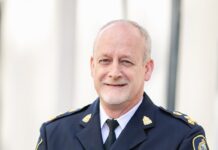
Constable Arthur Wlodyka waits with the heartbroken man and his family for hours.
This tragic scene is the 911 call that sticks with Wlodyka the most during his 10 years with the New Westminster Police Department.
“I felt helpless,” said Wlodyka. “And disappointed I wasn’t able to help them more.”
Wlodyka’s first-hand experience with traumatic police work led him to graduate school at the University of British Columbia to study counselling psychology.
Police work is high stress and research shows that police officers, or first responders, can be at a greater risk of post-traumatic stress disorder than civilians. In recent years, a number of high-profile suicides by law enforcement have made headlines, including the 2014 death of a former RCMP officer, who witnessed a beheading on a Greyhound a bus a few years earlier.
But the stigma of cops seeking help persists.
To help fight this stigma, Wlodyka’s master’s thesis at UBC examines police stressors and the attitudes of officers towards seeking professional psychological help, the first study of its kind in Canada.
Through surveys of 100 cops from three police departments in B.C.’s Lower Mainland, Wlodyka heard dozens of stories about the unique stressors facing police officers, categorized as repeat exposure to human suffering.
The most distressing to many of those surveyed were cases involving child sexual assault victims or sudden infant death syndrome. Next of kin notifications were especially difficult.
“You can’t go to a call with somebody begging or crying for help and think it’s not going to affect you,” said Wlodyka. “We’re not robots. Telling someone their loved one has died tragically or horrifically moves you in ways that’s hard to explain.”
The study found B.C. police officers held more positive attitudes towards seeking psychological support than college students, teachers and police officers in the United States.
“This was a surprising and important finding as attitudes can be an indicator of future behaviour,” said Wlodyka. “It suggests this sample of police officers would be open to using counselling services and other mental health resources.”
Staff shortages were identified by the police officers as the biggest organizational stress, and fatigue and paperwork ranked high as operational stressors.
“Paperwork brings a significant liability,” said Wlodyka. “Under a media microscope, note taking and reports are under increased scrutiny.”
Peer support, especially after a traumatic event or during an oversight investigation, was seen as particularly helpful to managing stress. In addition, the majority of police officers surveyed were in favour of the implementation of a mandatory counselling session every two years within their organizations.
For Wlodyka, he thinks his graduate research will prove useful on the job.
“It’s given me the knowledge I need to try and improve current mental health services, make recommendations and to advocate on behalf of my colleagues,” he said.
“Being a police officer is all I ever wanted to do.”










